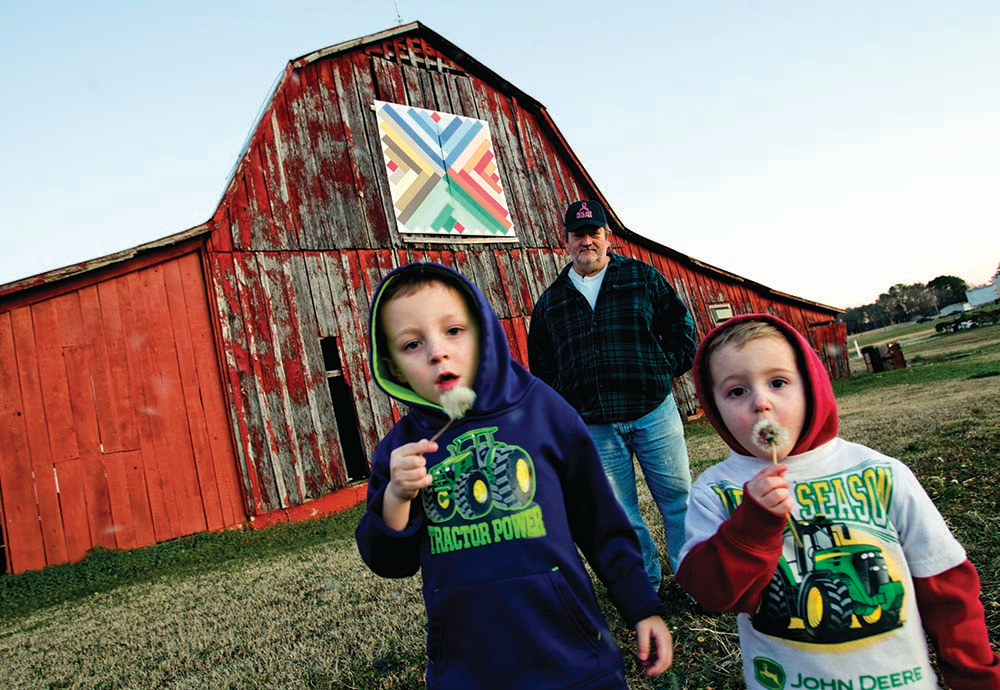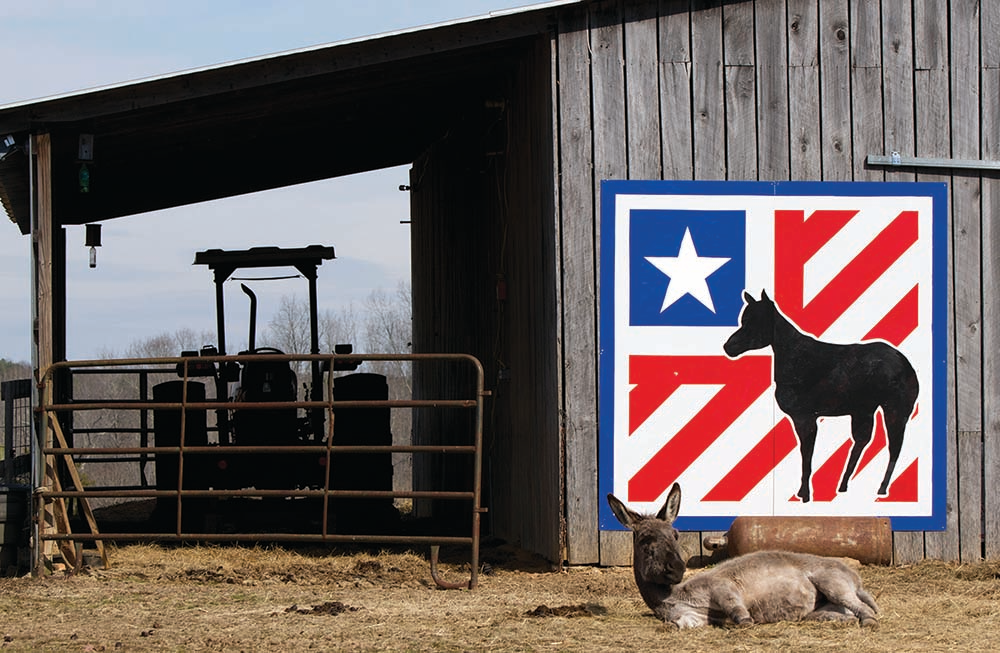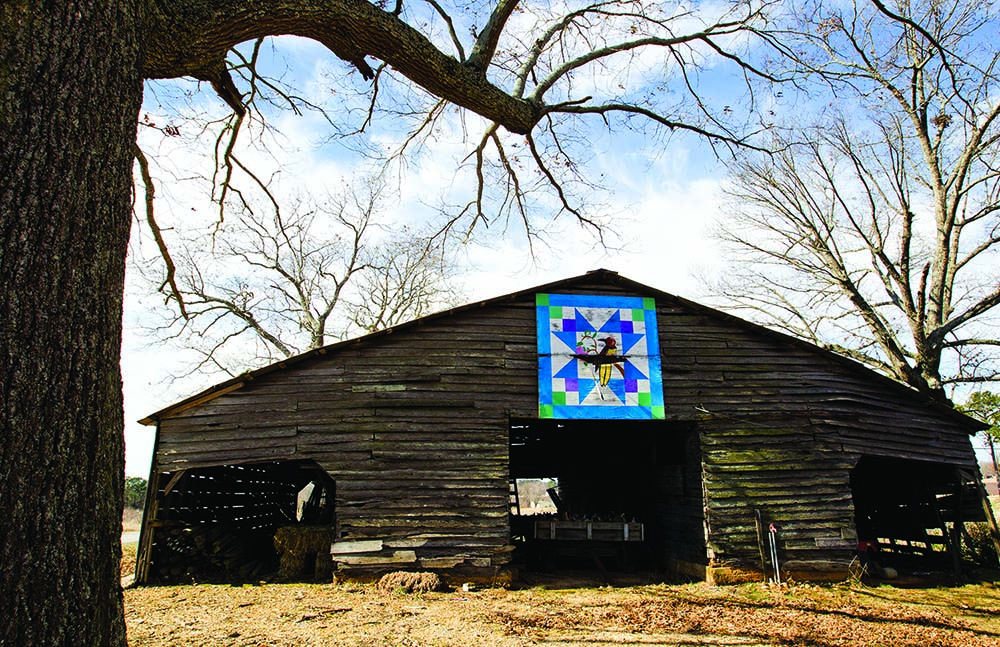Barn Quilt Trail honors tradition, boosts tourism

On the rural roads her job as a traveling nurse often sends her to, Regina Painter saw her first barn quilt. Today, a few years later, she paints many of the colorful metal quilt blocks that adorn old barns along north Alabama’s backroads as part of the Alabama Barn Quilt Trail.
The idea of the trail is to attract drivers to take the scenic route in celebration of Alabama’s rural, agricultural and artistic heritage. The trail honors families, hobbies and the beloved pastime of quilting with modular samples of patterns hanging from old barns.
Painter is a fabric quilter first, and in May her mother turned 80 years old. In recognition of the milestone, a grandmother’s flower garden pattern block hangs on her barn in Killen. That pattern was 85-90 years old, and the quilt kept Painter warm at night as a child.
Now, this colorful block, and others like it, warms both the surrounding landscape and the hearts of tourists who pull over for a closer look.
“It brightens the countryside,” says Painter, who leads the barn quilt project in Lauderdale County. “We can’t believe it. We’re so excited that it’s catching on.”
To drive the trail for yourself, use the Google Map on alabamabarnquilttrail.org.

Keeping tradition alive
From mosaic-style crazy quilts, lone star patterns, familiar wedding ring blocks and conical haberdashery squares, barn quilts are the latest chapter in the centuries-long history of quilting. Most are heirloom patterns handed down in the family. Others are chosen purely for their geometry and vibrant color.
Ricky Aycock’s pattern on his family’s barn on Old Highway 20 in Tuscumbia, just outside Leighton, is a log cabin pattern from his great-great grandmother. Its bold color on a large 8-foot by 8-foot block hanging on a red barn will draw your eyes from the road. Aycock’s father lives in the barn now, and he has noticed drivers pull over for a picture.
His family has a history of farming cotton, soybean and cattle in Leighton. The quilts decorate barns that house and shelter livestock and crops, reminding drivers that “the farming community is still a very important and vital part of our lives,” Painter says.
There are roughly 40 blocks on the Alabama Barn Quilt Trail and eight more are in the works, including ones in Hamilton, Detroit and Franklin County.
The first quilt block in Lauderdale County went up in December 2015, a product of trails that began in Kentucky and Ohio. The trail spread to Colbert, Lawrence, Marion and Winston counties in Alabama and last year received a grant from the state that will add other counties.
“We prefer the older barns, but we will put blocks on newer barns sometimes,” Painter says.
Word about the trail is spreading.
Alabama’s Bicentennial Commission included the trail in the state’s 200th anniversary celebrations this year. Painter held a workshop in Russell County in October and another in Lauderdale County in January. Both were full.
“It’s very exciting and is yet another way to expose our heritage and has a vast authenticity,” says Susann Hamlin, president of the Colbert County Tourism and Convention Bureau.
Hamlin remembers sitting as a young girl playing paper dolls while her grandmother’s quilting circle sewed.
The trail is “a fabulous way to showcase artists and their craft and the heritage of the South,” she says.
She hopes the trail will attract newcomers to the art of quilting.
“People still like the idea of quilting,” she says. “It might inspire people to start quilting again. Who knows?”

Bringing people together
The first blocks on the trail were wooden and proved too heavy and cumbersome to hang long term, so Dale Robinson of Florence started stenciling patterns on the same aluminum that road signs are made of.
“We found that the metal is so much easier and more durable, and it’s lighter,” he says.
He and his wife, Lisa, have been involved with the trail for two years after they read an article about it in the TimesDaily newspaper in Florence. Lisa paints blocks.
The quilt trail joins volunteers from all walks of life, including retirees such as Robinson, art students from the University of North Alabama who help stencil and paint blocks and professionals such as Painter for whom the trail has become a meaningful project.
Robinson has Parkinson’s Disease and said stenciling quilt patterns keeps his active and his mind sharp.
“It’s a challenge,” he says. “My wife enjoys it, so it makes her happy, so it makes me happy.”

For barn owners who would like to display a quilt block:
Email the quilt trail coordinators at [email protected]
(this address and other helpful information is on the website at alabamabarnquilttrail.org)
• Patterns must be on 8×8 or 4×4 blocks
• The barn must be visible from the road, and has space for drivers to pull over and take photos
• No blocks with names or political references or other potential for controversy will be considered.
• The web site also pinpoints all barn locations on a Google map, so start making plans for a road trip!




